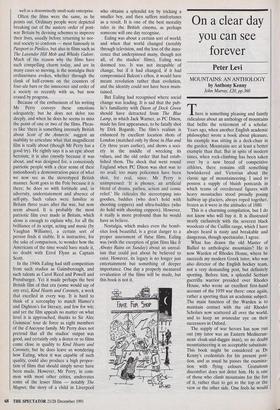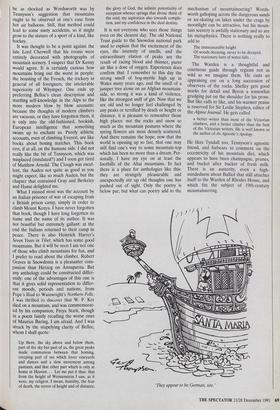On a clear day you can see forever
Peter Levi
MOUNTAINS: AN ANTHOLOGY by Anthony Kenny John Murray, f20, pp.360 There is something pleasing and faintly ridiculous about an anthology of mountains that befits the retirement of a scholar. Years ago, when another English academic philosopher wrote a book about pleasure, his example was sitting in a deck-chair in the garden. Mountains are at least a better example than that. But in spite of modern times, when rock-climbing has been taken over by a new breed of competitive athletes, there remains still something bewhiskered and Victorian about the classic age of mountaineering. I used to possess a supply of bluish postcards in which teams of overdressed figures with heavy moustaches stood proudly posing halfway up glaciers, always roped together, frozen as it were in the attitudes of 1880.
This is a charming compilation, but I do not know who will buy it. It is illustrated nearly exclusively with the severest black woodcuts of the Cuillin range, which I have always heard is nasty and breakable and dangerous, though spectacular, I agree.
What has drawn the old Master of Balliol to anthologise mountains? He is now Warden of Rhodes House, where he succeeds my modern Greek tutor, who was also director of the English hockey team, not a very demanding post, but definitely sporting. Before him, a splendid Serbian guerrilla warrior presided over Rhodes House, who wrote an excellent first-hand account of the 1939 war there: once again, rather a sporting than an academic subject. The main function of the Warden is to maintain contact with the old Rhodes Scholars now scattered all over the world, and to keep an avuncular eye on their successors in Oxford.
The supply of war heroes has now run out (my tutor was an Eastern Mediteran- nean cloak-and-dagger man), so no doubt mountaineering is an acceptable substitute. This book might be considered as Dr Kenny's credentials for his present posi- tion, and as usual he passes the examina- tion with flying colours. Gratuitous discomfort does not deter him. He is one of those who climb mountains for the fun of it, rather than to get to the top or the view or the other side. One feels he would be as shocked as Wordsworth was by Tennyson's suggestion that mountains ought to be observed at one's ease from hot air balloons. Still, that method could lead to some nasty accidents, so it might grow to the stature of a sport of a kind, like hockey.
It was thought to be a point against the late Lord Cherwell that his rooms were entirely decorated with photographs of mountain scenery. I suspect that Dr Kenny would agree. It is certainly curious how mountains bring out the worst in people: the boasting of the French, the trickery in general of all foreigners, the intolerable superiority of Whymper. One ends up preferring Belloc's clean description and startling self-knowledge in the Alps to the more modern blow by blow accounts: because the thoughts of modern climbers are vacuous, or they have forgotten them, it is only into the old-fashioned, bookish, European intelligence that something swims up to enchant us. Purely athletic accounts, even of climbing Everest, are like books about boxing matches. This book errs, if at all, on the humane side. I did not really like the bit of Tennyson, which was misplaced (misdated?) and I soon got tired of Matthew Arnold. The Clough was excel- lent, the Auden not quite as good as you might expect, like so much Auden, but the chapter that contained Gray and Berkeley and Hume delighted me.
What I missed most was the account by an Italian prisoner of war of escaping from a British prison camp, simply in order to climb Mount Kenya. I have never forgotten that book, though I have long forgotten its name and the name of its author. It was not boastful but extremely gallant: at the end the Italians returned to their camp in peace. There is also Heinrich Harrer's Seven Years in Tibet, which has some good mountains. But it will be seen I am not one of those who climb mountains for fun, and I prefer to read about the climber. Robert Graves in Snowdonia is a pleasanter com- panion than Herzog on Annapurna. But any anthology could be constructed differ- ently: one of the advantages of this one is that it gives solid representation to differ- ent moods, periods and nations, from Pope's Iliad to Wainwright's Northern Fells. I was thrilled to discover that W. P. Ker died on a mountain, and was commemorat- ed by his companion, Freya Stark, though In a poem faintly recalling the worse ones of Maurice Baring, I am afraid. And I was struck by the stupefying clarity of Belloc, whom I shall quote: Up there, the sky above and below them, part of the sky but part of us, the great peaks made communion between that homing, creeping part of me which loves vineyards and dances and a slow movement among pastures, and that other part which is only at home in Heaven... Let me put it thus: that from the height of Weissenstein I saw, as it were, my religion. I mean, humility, the fear of death, the terror of height and of distance,
the glory of God, the infinite potentiality of reception whence springs that divine thirst of the soul; my aspiration also towards comple- tion, and my confidence in the dual destiny.
It is not everyone who sees those things even on the clearest day. The old National Trust guide to the Snowdon national park used to explain that the excitement of the eyes, the intensity of smells, and the extraordinary elation of peaks are the result of racing blood and thinner, purer air like a dose of oxygen. Experience does confirm that: I remember to this day the strong smell of bog-myrtle high up in Wales many years ago, and the smell of a juniper tree alone on an Afghan mountain- side, so strong it was a kind of violence, like the strongest sniff of gin. Now that we are old and no longer feel challenged by any peaks or terrified by death or height or distance, it is pleasant to remember those high places: not the rocks and snow so much as the mountain pastures where the spring flowers are most densely scattered. And there remains the hope, now that the world is opening up so fast, that one may still find one's way to some mountain-top which has been no more than a dream. Per- sonally, I have my eye on at least the foothills of the Altai mountains. In fact there is a place for anthologies like this: they are strangely pleasurable and unexpectedly stir up old thoughts one has pushed out of sight. Only the poetry is below par, but what can poetry add to the mechanism of mountaineering? Words- worth galloping across the dangerous sands or ice-skating on lakes under the crags by moonlight can be attractive, but his moun- tain scenery is awfully stationary and so are his metaphysics. There is nothing really to add to
The immeasurable height Of woods decaying, never to be decayed, The stationary lasts of water-falls ...
The Warden is a thoughtful and courteous guide through regions not as wild as we imagine them. He casts an appraising eye on a long succession of observers of the rocks. Shelley gets good marks for detail and Byron a somewhat grudging pat on the shoulder for his prose. But like calls to like, and his warmer praise is reserved for Sir Leslie Stephen, editor of the Alpine Journal. He gets called a better writer than most of the Victorian climbers, and a better climber than the best of the Victorian writers. He is well known as the author of An Agnostic's Apology.
He likes Tyndall too, Tennyson's agnostic friend, and forbears to comment on the eccentricity of his mountain diet, which appears to have been champagne, prunes, and bucket after bucket of fresh milk. There is an austerity, even a high- mindedness about Balliol that still attaches itself to the Warden of Rhodes House, and which fits the subject of 19th-century mountaineering.
`They appear to be German, sire.'











































































































 Previous page
Previous page